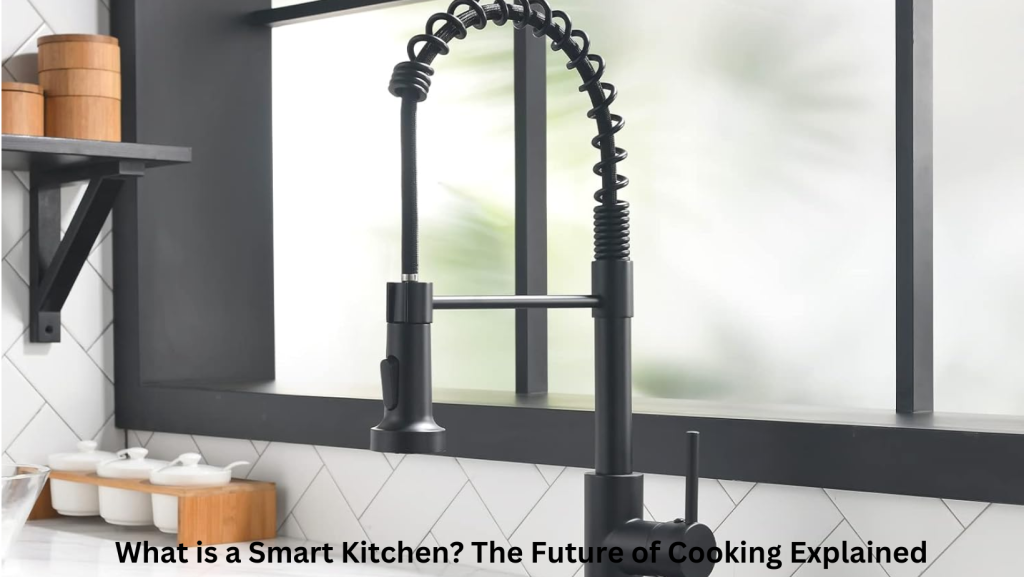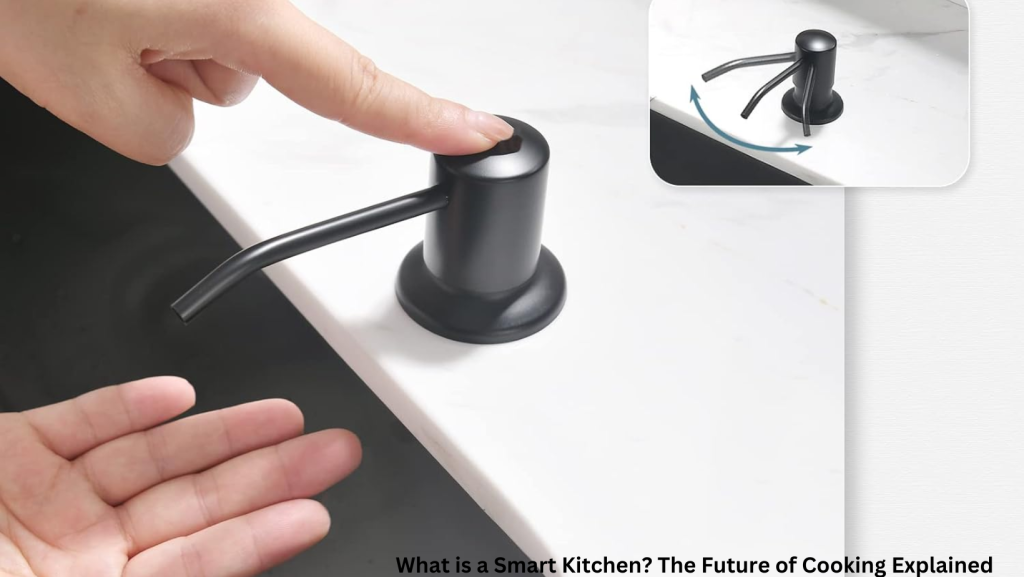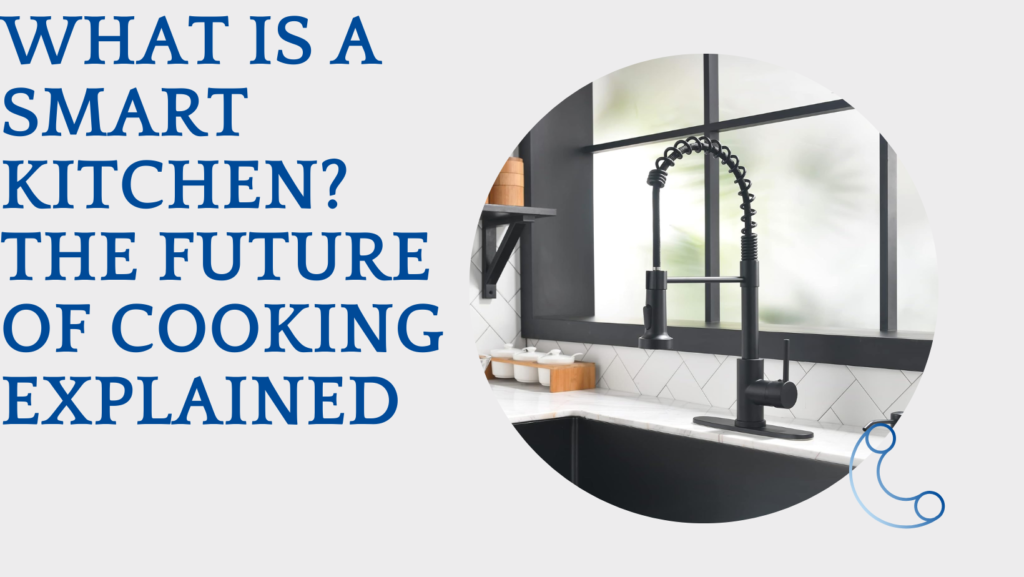The tasks involved in cooking alongside kitchen management seem to never stop. The management of groceries along with appliance efficiency creates overwhelming challenges for many users. The combined requirements for time-saving ecologically responsible kitchen solutions are trigger points for becoming frustrated.
Smart kitchens serve as the solution for these challenges. This blog explains smart kitchen technology with an explanation of its system functions and describes its life-enhancing capabilities. This article explores how technology turns everyday activities into streamlined performances for smart appliances including faucets and minor kitchen improvements.
Discovering the Magic of Smart Kitchens
A kitchen isn’t just a place to cook anymore. Today, it can be a space powered by technology to make life easier, faster, and more enjoyable. This is the idea behind smart kitchens, where innovation meets everyday living.
Discovering the magic of smart kitchens transforms everyday cooking into a seamless and efficient experience. With advanced technology like voice-controlled appliances, automated cooking settings, and AI-powered meal planning, smart kitchens make food preparation easier and more enjoyable. Smart refrigerators track inventory, while smart ovens ensure perfect cooking temperatures with minimal effort. Energy-efficient devices also help reduce waste and lower utility bills. By integrating smart kitchen gadgets, homeowners can enjoy a more convenient, safe, and modern culinary space.
What Makes a Kitchen Smart?
A smart kitchen is all about using advanced tools and devices to simplify tasks. At its heart is the Internet of Things (IoT)—a system that connects your appliances so they can “talk” to each other. For example, your fridge can alert you when you’re low on milk, or your oven can send notifications to your phone when dinner is ready. It’s about making cooking and organizing smoother and stress-free.
What makes a kitchen smart? A smart kitchen integrates advanced technology to enhance convenience, efficiency, and safety. It features smart appliances like refrigerators that track inventory, ovens with Wi-Fi connectivity for remote control, and voice-activated assistants for hands-free operation. Automated lighting, energy-efficient devices, and app-controlled gadgets streamline cooking and meal planning. These innovations not only save time but also improve functionality, making daily tasks easier and more intuitive. A truly smart kitchen adapts to user needs, offering a seamless blend of technology and practicality.
Key Features That Set Smart Kitchens Apart
- Voice-Controlled Assistants
Imagine saying, “Alexa, preheat the oven to 375°F,” and the oven does it instantly. Voice assistants like Alexa and Google Assistant turn your words into actions, saving you time and effort. - Touchless Technology
Smart kitchens come with touchless faucets and sensors. You can wave your hand to turn on the tap or open the trash can without touching anything. It’s cleaner, especially when you’re handling raw food. - Energy Efficiency
Smart appliances are designed to use less energy. A smart dishwasher, for example, adjusts its water and power usage based on how dirty the dishes are. Not only do you save money, but it’s also better for the environment. - Personalized Convenience
Every family has unique needs. Smart kitchens let you customize settings. You can program your coffee maker to start brewing at 7 AM or set your refrigerator to keep fruits fresher for longer.
The Building Blocks of a Smart Kitchen
A smart kitchen is more than just a trendy concept; it’s a combination of thoughtfully designed elements that make life easier and more efficient. Let’s break down the key components that bring a smart kitchen to life.
The building blocks of a smart kitchen include a combination of innovative appliances, automation, and connectivity that enhance efficiency and convenience. Key elements include smart refrigerators that monitor food inventory, Wi-Fi-enabled ovens for precise cooking, and voice-activated assistants for hands-free control. Smart lighting, touchless faucets, and energy-efficient appliances further contribute to a seamless kitchen experience. Integration with mobile apps allows users to control and monitor their kitchen remotely, making cooking and meal planning more intuitive. By combining these technologies, a smart kitchen simplifies daily tasks while promoting energy savings and enhanced functionality.

Smart Kitchen Appliances: Efficiency Redefined
Smart appliances are the stars of a modern kitchen. They are designed to connect to the internet and work smarter, not harder.
- What They Are:
Smart kitchen appliances include refrigerators, ovens, dishwashers, and more. These devices go beyond their traditional functions by offering connectivity and automation. - An Example in Action:
Imagine opening your refrigerator and seeing a screen that displays recipes based on the food you already have. That’s the magic of a smart fridge. It can also alert you when you’re low on essentials like eggs or milk. - Why They Matter:
These appliances save time, reduce waste, and make everyday cooking a breeze.
Smart Kitchen Faucets: Convenience at Your Fingertips
A faucet might seem simple, but a smart kitchen faucet takes it to another level.
- How They Work:
Smart faucets often include touchless controls, voice activation, and water-saving features. For example, you can say, “Turn on the tap” or wave your hand to get water flowing. - Real-Life Use Case:
Imagine you’re kneading dough, and your hands are covered in flour. With a smart faucet, you can get water without making a mess. - Added Benefits:
They help reduce water usage, making them eco-friendly and practical for busy kitchens.
Small Kitchen Appliances: Everyday Helpers
Small appliances like blenders, toasters, and coffee makers are essential in any kitchen. But in a smart kitchen, even these can be upgraded.
- What Makes Them Different:
A standard blender blends, but a smart blender might include pre-programmed settings for specific recipes. Similarly, a smart coffee maker can prepare your perfect cup right on schedule. - Emerging Trends:
More small kitchen appliances are being designed with connectivity, allowing users to control them via smartphone apps.
Why a Smart Kitchen is a Game-Changer
A smart kitchen isn’t just about cool gadgets—it’s about making life simpler, faster, and more sustainable. Let’s explore how a smart kitchen can benefit you.
1. Save Time with Automation
Time is precious, and a smart kitchen helps you save plenty of it.
- How It Works:
Smart devices can handle repetitive tasks for you. For instance, a smart coffee maker can brew your coffee before you wake up, and a smart oven can preheat itself as you plan your meal. - Why It Matters:
You spend less time doing small chores and more time enjoying your day.
2. Cook Like a Pro
A smart kitchen takes the stress out of cooking and makes it more enjoyable.
- What’s Different:
Some smart appliances suggest recipes based on what’s in your fridge. Others come with built-in timers or reminders to prevent overcooking. - Real-Life Perks:
Imagine following step-by-step instructions on a smart display while your oven adjusts itself to the perfect temperature. Cooking has never been this easy.
3. Save Energy, Save Money
Smart kitchens are designed to use less energy without compromising performance.
- How It Helps:
Appliances like smart refrigerators and dishwashers adjust their power consumption based on your usage. - The Result:
You cut down on electricity bills while being kinder to the environment.
4. A Sustainable Approach
Smart kitchens help you reduce waste, both in water and food.
- For Water Usage:
Smart faucets are equipped with sensors to ensure water only flows when needed, preventing unnecessary waste. - For Food Waste:
Smart fridges can remind you of expiration dates and suggest recipes to use items before they go bad.
Challenges and Considerations in Building a Smart Kitchen
While smart kitchens bring convenience and innovation, they also come with a few hurdles. It’s important to consider these challenges before diving in.

1. High Costs of Installation and Maintenance
Building a smart kitchen can be expensive.
- What You’ll Spend:
Smart appliances and systems often cost more than regular ones. Adding connectivity, sensors, and advanced features increases the price. - Ongoing Expenses:
Repairs and updates for smart devices can also be costly. This is something to keep in mind when planning your budget.
2. A Steep Learning Curve
Not everyone is comfortable with technology, and that can be a challenge.
- For Beginners:
People who aren’t tech-savvy may struggle to understand how to use smart appliances or connect them to apps. - What Can Help:
Most devices come with guides and tutorials, but patience and practice are often needed to get the hang of things.
3. Privacy Concerns with Connected Devices
Interconnected smart devices collect and share data, which raises concerns.
- The Risk:
Devices like smart speakers and cameras might collect personal information. There’s always a risk of data breaches or hacking. - How to Stay Safe:
Use strong passwords, update your devices regularly, and choose brands with good security features.
4. Compatibility Issues Between Devices
Not all smart devices work well together.
- The Problem:
Devices from different brands may use different apps or systems, making it hard to create a seamless smart kitchen. - The Solution:
Look for products that support universal standards like Wi-Fi, Bluetooth, or specific smart home platforms (e.g., Google Home or Amazon Alexa).
The Future of Smart Kitchens
Smart kitchens are not just about convenience today—they’re shaping how we cook, save resources, and live tomorrow. Let’s take a glimpse into what the future holds.
1. AI That Understands Your Needs
Artificial intelligence is expected to play a bigger role in smart kitchens.
- What It Could Do:
AI systems might learn your cooking habits and preferences. They could suggest meals based on what you like, what’s in your fridge, and even your dietary goals. - Imagine This:
A kitchen that preps ingredients or sets cooking timers automatically based on the recipe you’re following.
2. Smarter Sustainability Solutions
Future smart kitchens will focus even more on saving resources like water and energy.
- Innovations Coming Soon:
Kitchens could have systems that recycle water from sinks for cleaning or irrigation. Advanced appliances may use even less power while still being effective. - Why It Matters:
These innovations could help households lower their environmental impact and reduce utility costs.
3. Fully Automated Meal Preparation
The idea of a kitchen that cooks for you might become a reality.
- How It Would Work:
Robotic systems could chop, mix, and even plate your meals. You’d simply choose a recipe or meal plan, and the kitchen would handle the rest. - What This Means for You:
Cooking could become faster, easier, and more precise, leaving you more time to focus on other things.
Conclusion
Smart kitchens are changing the way we cook, save time, and use resources. By combining automation, connectivity, and energy efficiency, they bring convenience and innovation to modern homes.
Whether it’s smart appliances that simplify meal prep, faucets that save water, or systems that reduce waste, a smart kitchen can make your daily life easier and more sustainable.
When considering a smart kitchen, think about your needs and lifestyle. Start small with a few smart devices or go all-in with a fully connected setup. Whatever you choose, smart kitchen solutions are designed to create a space that works for you.

FAQs Section
What is a smart kitchen faucet?
A smart kitchen faucet is designed to make tasks easier and more efficient. It often includes touchless features, meaning you can turn it on or off with a wave of your hand. Some faucets also respond to voice commands or preset water temperature and flow settings. These features save water and make cooking and cleaning more convenient.
What is a smart kitchen appliance?
Smart kitchen appliances are devices connected to the internet, offering advanced features to simplify cooking and household tasks. Examples include:
- Smart Ovens: They can preheat, adjust cooking times, or even follow recipes automatically.
- Smart Refrigerators: They track groceries, suggest recipes, and help you avoid food waste.
What is a small kitchen appliance?
What is a small kitchen appliance? A small kitchen appliance is a compact, portable, and often electric device designed to assist with specific cooking or food preparation tasks. Common examples include blenders, toasters, coffee makers, air fryers, and slow cookers. These appliances enhance convenience by speeding up cooking processes, improving efficiency, and offering specialized functions. Unlike large kitchen appliances like refrigerators or ovens, small kitchen appliances are easy to move and store, making them ideal for both small and large kitchens alike.
Small kitchen appliances are compact devices like blenders, toasters, and coffee makers. Unlike traditional ones, some small appliances now come with smart features. For example, a smart coffee maker can be programmed from your phone to brew at a specific time.
Are smart kitchens expensive?
Smart kitchens can be costly, but there are options for every budget. High-end setups with multiple smart devices may require a larger investment. However, budget-friendly choices like a single smart faucet or a smart plug for existing appliances make it possible to start small and upgrade over time.
Are smart kitchens expensive? The cost of a smart kitchen varies depending on the level of technology and automation you choose. While high-end smart appliances, such as Wi-Fi-enabled refrigerators and AI-powered ovens, can be costly, there are also budget-friendly options like smart plugs, LED lighting, and voice-controlled assistants that add convenience without a hefty price tag. Investing in energy-efficient smart devices can also lead to long-term savings on utility bills. Ultimately, a smart kitchen can be customized to fit different budgets, making advanced kitchen technology accessible to many homeowners.

I’m a writer and culinary expert with over 10 years of experience in the kitchen. As a graduate of the Institute of Culinary Education and a passionate home chef, I created KitchenBreez.com to share my knowledge of kitchen techniques, cooking tips, and the best kitchen gadgets. Whether you’re a seasoned cook or just starting, my goal is to help you make your time in the kitchen more efficient and enjoyable.
